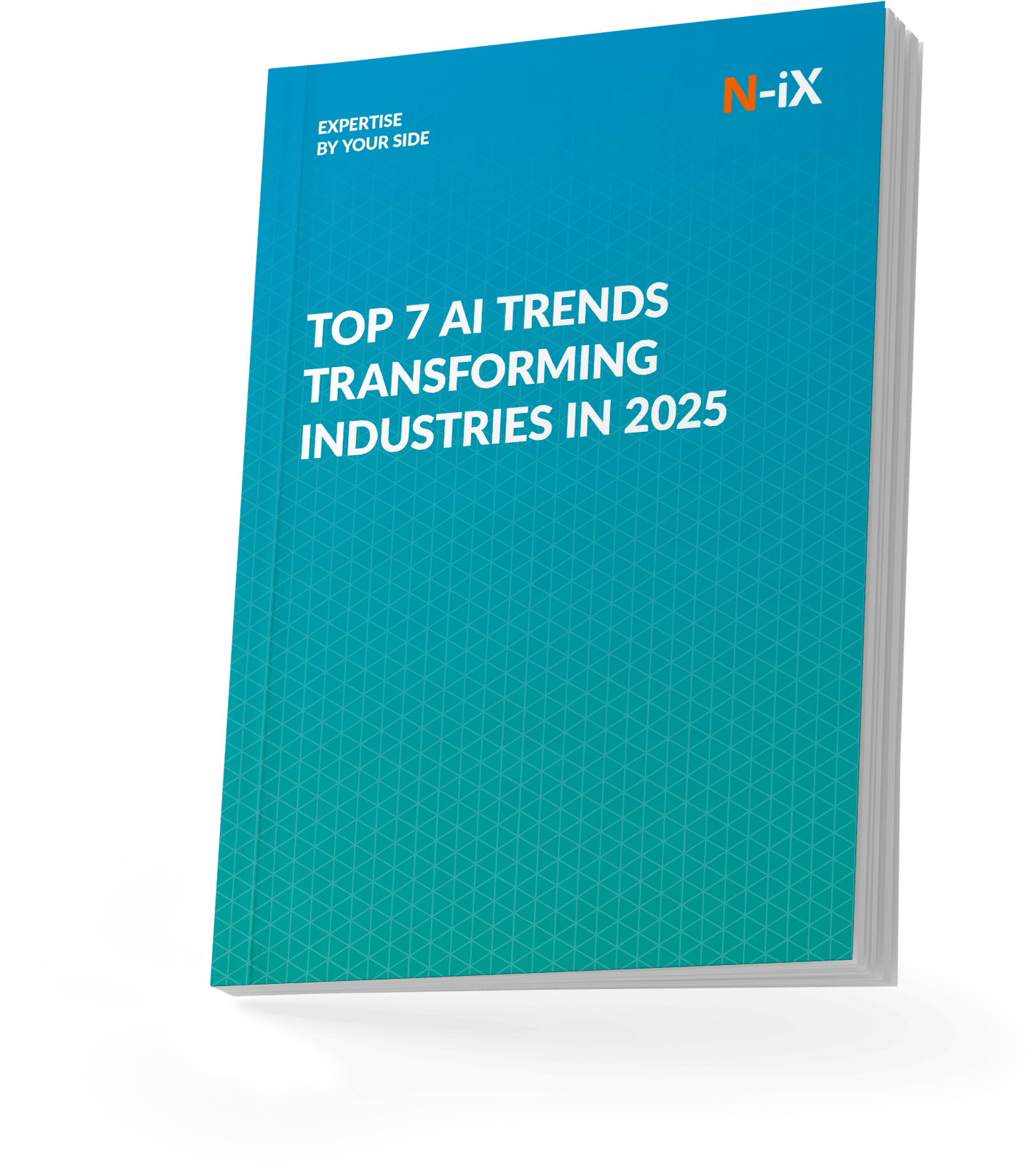Every enterprise relies on data, but how much of it is actually usable? How often do reports take too long to generate, contain errors, or fail to provide a clear picture? And with growing security risks and compliance requirements, how much time is spent ensuring data is properly managed? For most organizations, the answer is too much time, too many errors, and insufficient value.
AI changes this. Instead of constantly fixing and maintaining data, AI and Machine Learning algorithms automate data integration, governance, security, and analytics. It reduces manual work, improves accuracy, strengthens security, and ensures compliance without constant oversight. In this guide, we'll explain how AI data management works, the real problems it solves, and how enterprises can implement it effectively based on the vast expertise of AI consulting services from N-iX. Let's get into it.
Outlook on data management process
Data management has long been a fragmented process where different departments operate in silos, leading to inconsistent data quality. Meanwhile, data management services is about ensuring that data is:
- Accurate-free of errors, inconsistencies, and duplication.
- Accessible-available to the right stakeholders at the right time.
- Secure-protected from unauthorized access, breaches, and misuse.
- Governed-aligned with internal policies and external regulatory standards.
- Integrated-unified across multiple platforms and systems for a single source of truth.

To achieve these goals, enterprises must adopt a data management strategy that combines governance, standardization, and technological infrastructure. When these elements work together, they create a data ecosystem that efficiently manages core business data and ensures its usability across the enterprise.
- Governance: Establishing clear ownership, accountability, and decision-making frameworks for data assets.
- Measurement: Ensuring data management success is tracked through KPIs and performance benchmarks.
- Organization: Structuring data in a way that aligns with business needs, making it easier to store, retrieve, and analyze.
- Policy: Defining rules and standards for data access, usage, and sharing across the organization.
- Process: Implementing workflows and standard operating procedures (SOPs) for data collection, validation, transformation, and storage.
- Technology: Leveraging advanced tools and platforms to automate data integration, quality management, and analytics.

Here's the point: AI algorithms can enhance, integrate, and optimize all these components within an organization. AI and ML cover the gaps in traditional approaches and elevate the enterprise's ability to scale and innovate confidently.
Read also: How to prepare data for AI
What is AI-driven data management?
AI data management involves applying artificial intelligence and ML, natural language processing (NLP), and predictive analytics technologies to automate, optimize, and secure data throughout its lifecycle. Data management AI goes beyond traditional rule-based approaches by introducing intelligent automation, real-time data processing, and adaptive governance-allowing enterprises to handle large volumes of structured and unstructured data.
AI does not replace data management-it enhances and optimizes it. According to Delloite Insights [1], 83% of respondents reported moderate to substantial benefits from using AI in data management; AI provides several advantages:
- Automating repetitive tasks such as data validation, quality control, and standardization
- Improving data accuracy by detecting and correcting inconsistencies
- Enhancing data integration across multiple platforms and systems
- Providing predictive insights to support data-driven decision-making
- Automating data processing, reducing reliance on manual review of thousands of data points
- Enhancing real-time risk detection, allowing data teams to respond faster to emerging trends
By embedding AI into data management processes, enterprises can move beyond static rules and manual workflows to a dynamic, self-optimizing data ecosystem. This transformation is particularly evident across various real-world applications of AI in data management.
Explore the AI landscape of 2025—get the guide with top trends!


Success!

How AI complements data management: 5 potential use cases

1. AI for data discovery
Data discovery is critical to enterprise data management, enabling organizations to locate, classify, and understand their data assets across diverse systems. However, traditional data discovery methods struggle to keep pace with enterprise data's growing volume, variety, and velocity. AI-driven data discovery automates and enhances this process, improving visibility, governance, and accessibility.
Further down, we explore key AI-driven capabilities that enhance data discovery and classification at scale.
- Data extraction and classification: AI enables enterprises to extract, structure, and classify this information at scale, eliminating manual intervention. Advanced AI-powered optical character recognition (OCR) extracts key information from images and scanned documents, ensuring business-critical data is searchable and accessible. Entity recognition models identify names, locations, monetary values, and other essential attributes, converting unstructured content into structured, actionable datasets.
- Data scanning and indexing: AI data management automates large-scale data scanning and indexing, ensuring datasets are continuously updated, classified, and structured. ML models analyze metadata, context, and content to generate real-time data maps, helping organizations maintain visibility into their entire data ecosystem. AI-driven data discovery tools go beyond static indexing by continuously mapping relationships across disparate datasets.
- Automated classification of sensitive information: AI models scan enterprise datasets to detect personally identifiable information (PII), financial records, intellectual property, and other high-risk data categories. Unlike rule-based classification systems, AI continuously learns and adapts, refining its ability to recognize new patterns and risks. When NLP identifies sensitive text within documents, emails, and unstructured datasets, AI automatically applies data protection policies based on classification, preventing unauthorized access or sharing.
At N-iX, we leverage generative AI for data management to structure and optimize diverse data distributions, enabling enterprises to extract meaningful insights from vast and unstructured datasets. One of our key successes involved a P2P review platform, where we implemented advanced clustering algorithms to categorize user feedback efficiently. Using GPT-4, BERTopic, and other ML techniques, our AI development team created an intelligent system that analyzes user reviews, identifies critical keywords, and generates structured topic clusters.
Discover more details on improving the user experience of a P2P review platform with Machine Learning and NLP
2. AI for data accessibility
Fragmented data landscapes create significant challenges in accessibility. A report from IBM highlights that data silos hinder operations and data analytics in up to 80% of enterprises [2]. With AI, organizations can ensure that critical data is always available, searchable, and actionable. Below, we will explore specific solutions that enhance data accessibility across the enterprise.
- Unified data access: AI facilitates data unification by detecting relationships between disparate datasets, automatically mapping schemas, and ensuring interoperability across cloud, on-premises, and hybrid infrastructures. AI creates a single, unified view of enterprise data, eliminating silos and enabling real-time access for business users, analysts.
- Metadata management: Enterprises can automate datasets' tagging, classification, and indexing. Natural language processing models enhance usability by allowing business users to perform intuitive searches using conversational queries, eliminating the need for complex SQL commands or manual cataloging efforts.
- Real-time data synchronization: AI continuously updates and harmonizes datasets across enterprise applications, ensuring that teams can always access the most current information. Whether synchronizing financial records across global offices, aligning supply chain data in real-time, or updating customer insights for personalized marketing, AI ensures that data remains consistent and readily available across all platforms.
3. AI for data quality
Data quality is a fundamental requirement for enterprise operations, yet inaccurate, incomplete, or inconsistent data undermines decision-making, compliance, and analytics accuracy.
AI and data management addresses these challenges by automating data validation, anomaly detection, and standardization. The following examples illustrate how AI enhances data accuracy, consistency, and reliability across enterprise systems.
- Automated error detection and correction: AI in data management continuously scans enterprise databases, identifying and rectifying inaccuracies before they impact business operations. These tools go beyond simple rule-based checks by using ML models to adapt and improve over time. The technology identifies inconsistencies and outliers, flagging erroneous data before it contaminates analytics or decision-making processes.
- Intelligent data cleansing and deduplication: AI accurately detects and consolidates redundant records. Probabilistic matching algorithms detect duplicate customer profiles, supplier records, and transaction entries across disparate systems, guaranteeing a unified and accurate dataset. Additionally, AI-driven standardization models enforce uniform naming conventions, currency formats, and categorical data structures, ensuring consistency across enterprise databases.
- Proactive quality management: AI can fill data gaps by generating statistically accurate placeholders, ensuring that datasets remain complete even when information is missing. Machine learning models analyze historical trends to predict potential inconsistencies and outdated records, allowing enterprises to take corrective actions proactively.
4. AI for data security
The growing complexity of enterprise data ecosystems introduces significant security and governance risks. Organizations must protect sensitive data from breaches, ensure regulatory compliance, and maintain governance policies. AI data management automates data protection, compliance monitoring, and access control enforcement while reducing manual intervention.
Below are some of the most impactful applications of AI in data security.
- Data loss prevention: AI continuously monitors data access and usage patterns, preventing unauthorized sharing and leakage before breaches occur. AI also enforces security policies, including access restrictions, encryption, and redaction protocols, reducing the risk of exposure through emails, file transfers, or cloud storage.
- Anomaly-based threat detection: AI data management enhances security through user and entity behavior analytics (UEBA), continuously monitoring access patterns, login attempts, and network activity to detect anomalies that could indicate security breaches.
- Identity and access management (IAM): AI can automate access controls by continuously analyzing user roles, permissions, and behavioral patterns. By detecting overprivileged accounts and enforcing the principle of least privilege, AI maintains only authorized personnel's access to critical systems and data. Adaptive authentication adjusts security measures based on risk factors such as device type, login location, and behavioral history.
- Fraud detection: AI systems continuously monitor transactional data, analyzing behavioral patterns and external threat intelligence to identify real-time suspicious activities. These models can detect anomalies such as synthetic identities, fraudulent credit applications, and unauthorized financial transfers before they cause monetary losses. AI refines its detection capabilities over time by learning from historical fraud incidents.
5. AI for data integration
With the rise of multi-cloud architectures, hybrid deployments, and on-premises data ecosystems, consolidating and synchronizing data for businesses has become increasingly complex. AI solutions automate schema mapping, data transformation, and real-time synchronization, reducing the need for manual effort while improving accuracy and efficiency.
What role does AI play in turning disjointed data systems into unified, efficient pipelines?
- Automated schema mapping: AI analyzes relationships between datasets and automatically maps fields, attributes, and formats, enabling hassle-free migration between systems. This is especially valuable during mergers, acquisitions, and cloud migrations, where multiple data structures must be reconciled.
- AI-powered ETL optimization: AI optimizes data extraction, transformation, and loading by prioritizing critical datasets, identifying inefficiencies, and automating redundant processes. This significantly reduces latency and ensures data is processed at scale with minimal delays.
- Real-time data harmonization: AI for data management enables continuous data synchronization, ensuring consistency between transactional databases, analytics platforms, and AI-driven applications. Whether handling structured customer records, unstructured text data, or streaming IoT sensor inputs, AI ensures data remains up-to-date and aligned across systems.
Read more: AI data integration: A guide for streamlined, scaled, and optimized operations
Getting started with AI data management: Core tips for implementation
AI for data management requires a structured, strategic approach to ensure seamless integration with existing enterprise systems. N-iX specializes in designing AI-powered data ecosystems that enhance operational efficiency and accuracy.
Strategic data foundation
A well-structured data strategy is the basis of successful AI implementation. At N-iX, we work closely with enterprises to establish a centralized data strategy. Our team identifies relevant data sources, maps dependencies, and builds efficient data pipelines that ensure data is collected, processed, and made accessible in a structured, reliable manner. We help organizations move from fragmented, siloed data environments to unified, high-performance architectures.
Real-time data ingestion for always-on availability
Data-driven organizations cannot afford delays in data processing. We implement real-time data ingestion frameworks that capture, process, and synchronize data across cloud, on-prem, and hybrid environments. Our solutions leverage event-driven architectures, stream processing, and AI-powered anomaly detection to provide continuous data flow while eliminating bottlenecks.
Scalable data storage to support AI workloads
Enterprises managing large-scale AI workloads require highly scalable, high-performance storage solutions that adapt to increasing data volumes without compromising speed or reliability. Our team designs and implements scalable data architectures that balance cost, performance, and security while ensuring businesses remain future-proof.
N-iX delivers multi-cloud and on-premise storage solutions, optimizing infrastructure for AI-driven analytics, predictive modeling, and advanced data science applications. We specialize in distributed storage systems, high-performance data lakes, and cloud-native architectures, ensuring seamless data accessibility for AI and machine learning workloads.
Enterprise-grade data governance and compliance
Data privacy, security, and compliance are at the core of every AI-driven data strategy. Our data governance experts help enterprises establish automated compliance frameworks that ensure adherence to industry regulations. We proactively approach data governance, lineage tracking, and role-based access controls (RBAC).
Leveraging self-learning AI Models
The key to effective generative AI data management lies in self-learning, adaptive AI models that continuously improve data accuracy, security, and governance. N-iX specializes in developing and deploying AI solutions that detect inconsistencies, standardize datasets, and automate complex data operations.
Creating a data-first culture
Implementing AI data management is not just a technological shift-it's an organizational transformation. We help enterprises foster a data-first culture by enabling cross-functional collaboration, upskilling teams, and integrating AI into business workflows.
We believe that AI should not just process data-it should guide people. By embedding AI into the DNA of an enterprise, we help organizations gain a competitive edge, improve efficiency, and unlock new growth opportunities.
Moving from plans to progress with N-iX
With over 23 years of experience in data engineering, AI, and enterprise IT solutions, N-iX is a trusted partner for organizations looking to modernize their data management strategies. Our team includes over 200 experts in AI, ML, and data science. Our AI, cloud, and data governance expertise enables us to design and implement scalable, intelligent, and secure data ecosystems that fuel business growth. Our platform-agnostic approach also includes Couchbase consulting and support for other modern data technologies, enabling enterprises to select and implement the most appropriate data engines for real-time analytics, large-scale transactions, or AI-driven workloads.
From strategy and architecture design to AI-powered automation and compliance, we offer end-to-end solutions tailored to enterprise needs. Partner with N-iX to build future-proof, AI-driven data management solutions that drive efficiency, security, and business success.
Reference
- State of AI in the Enterprise, 2nd Edition - Delloite
- The Data Differentiator - IBM
Have a question?
Speak to an expert




